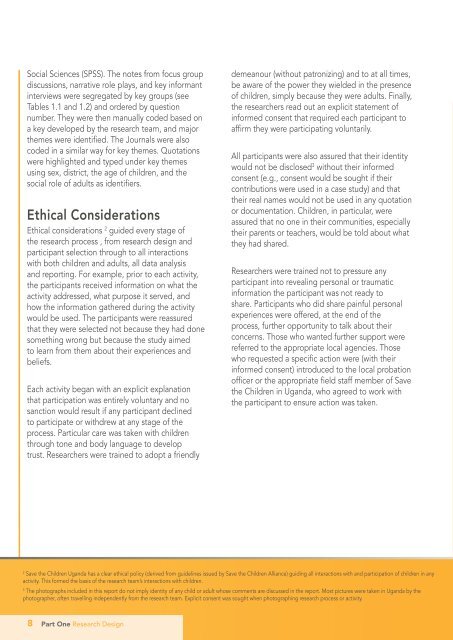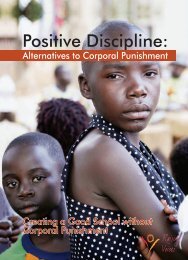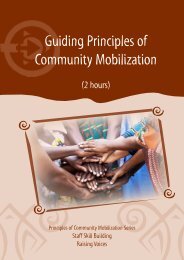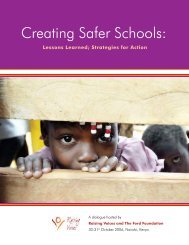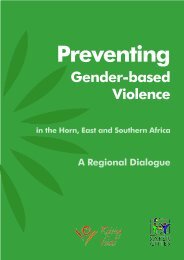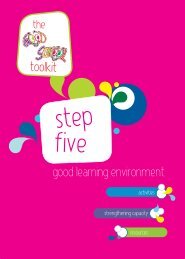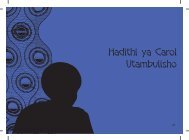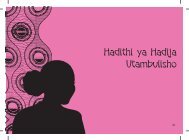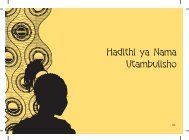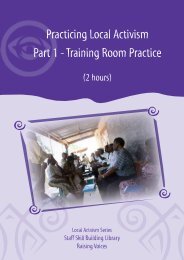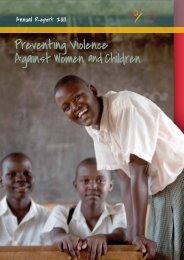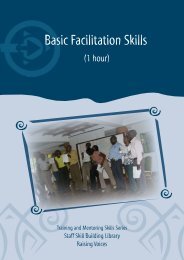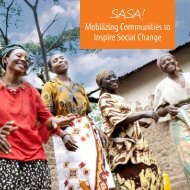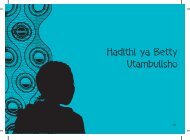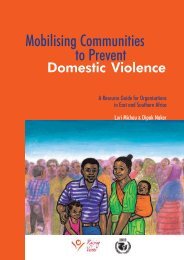Violence against children, the voices of Ugandan ... - Raising Voices
Violence against children, the voices of Ugandan ... - Raising Voices
Violence against children, the voices of Ugandan ... - Raising Voices
You also want an ePaper? Increase the reach of your titles
YUMPU automatically turns print PDFs into web optimized ePapers that Google loves.
Social Sciences (SPSS). The notes from focus groupdiscussions, narrative role plays, and key informantinterviews were segregated by key groups (seeTables 1.1 and 1.2) and ordered by questionnumber. They were <strong>the</strong>n manually coded based ona key developed by <strong>the</strong> research team, and major<strong>the</strong>mes were identified. The Journals were alsocoded in a similar way for key <strong>the</strong>mes. Quotationswere highlighted and typed under key <strong>the</strong>mesusing sex, district, <strong>the</strong> age <strong>of</strong> <strong>children</strong>, and <strong>the</strong>social role <strong>of</strong> adults as identifiers.Ethical ConsiderationsEthical considerations 2 guided every stage <strong>of</strong><strong>the</strong> research process , from research design andparticipant selection through to all interactionswith both <strong>children</strong> and adults, all data analysisand reporting. For example, prior to each activity,<strong>the</strong> participants received information on what <strong>the</strong>activity addressed, what purpose it served, andhow <strong>the</strong> information ga<strong>the</strong>red during <strong>the</strong> activitywould be used. The participants were reassuredthat <strong>the</strong>y were selected not because <strong>the</strong>y had donesomething wrong but because <strong>the</strong> study aimedto learn from <strong>the</strong>m about <strong>the</strong>ir experiences andbeliefs.Each activity began with an explicit explanationthat participation was entirely voluntary and nosanction would result if any participant declinedto participate or withdrew at any stage <strong>of</strong> <strong>the</strong>process. Particular care was taken with <strong>children</strong>through tone and body language to developtrust. Researchers were trained to adopt a friendlydemeanour (without patronizing) and to at all times,be aware <strong>of</strong> <strong>the</strong> power <strong>the</strong>y wielded in <strong>the</strong> presence<strong>of</strong> <strong>children</strong>, simply because <strong>the</strong>y were adults. Finally,<strong>the</strong> researchers read out an explicit statement <strong>of</strong>informed consent that required each participant toaffirm <strong>the</strong>y were participating voluntarily.All participants were also assured that <strong>the</strong>ir identitywould not be disclosed 3 without <strong>the</strong>ir informedconsent (e.g., consent would be sought if <strong>the</strong>ircontributions were used in a case study) and that<strong>the</strong>ir real names would not be used in any quotationor documentation. Children, in particular, wereassured that no one in <strong>the</strong>ir communities, especially<strong>the</strong>ir parents or teachers, would be told about what<strong>the</strong>y had shared.Researchers were trained not to pressure anyparticipant into revealing personal or traumaticinformation <strong>the</strong> participant was not ready toshare. Participants who did share painful personalexperiences were <strong>of</strong>fered, at <strong>the</strong> end <strong>of</strong> <strong>the</strong>process, fur<strong>the</strong>r opportunity to talk about <strong>the</strong>irconcerns. Those who wanted fur<strong>the</strong>r support werereferred to <strong>the</strong> appropriate local agencies. Thosewho requested a specific action were (with <strong>the</strong>irinformed consent) introduced to <strong>the</strong> local probation<strong>of</strong>ficer or <strong>the</strong> appropriate field staff member <strong>of</strong> Save<strong>the</strong> Children in Uganda, who agreed to work with<strong>the</strong> participant to ensure action was taken.2Save <strong>the</strong> Children Uganda has a clear ethical policy (derived from guidelines issued by Save <strong>the</strong> Children Alliance) guiding all interactions with and participation <strong>of</strong> <strong>children</strong> in anyactivity. This formed <strong>the</strong> basis <strong>of</strong> <strong>the</strong> research team’s interactions with <strong>children</strong>.3The photographs included in this report do not imply identity <strong>of</strong> any child or adult whose comments are discussed in <strong>the</strong> report. Most pictures were taken in Uganda by <strong>the</strong>photographer, <strong>of</strong>ten travelling independently from <strong>the</strong> research team. Explicit consent was sought when photographing research process or activity.8Part One Research Design


